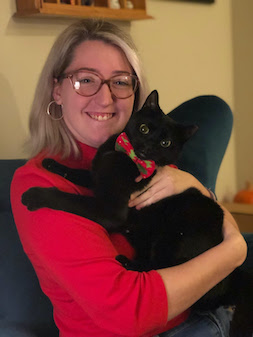Epiphany 4B, 28 January 2024. The Very Rev. Pamela L. Werntz
- Deuteronomy 18:15-20. This is what you requested.
- 1 Corinthians 8:1-13. Love builds up.
- Mark 1:21-28. A new teaching – with authority!
O God of compassion, grant us the wisdom, the strength and the courage to seek always and everywhere after truth, come when it may, and cost what it will.
This past week an angel of the Lord sent me a book about how to live in these terrible days and, at the same time, how to live in these beautiful days. The book is by theologian Kate Bowler: Have a Beautiful Terrible Day: Daily Meditations for the Ups, Downs, & In-Betweens. She writes about living with an apocalyptic (that is, revelatory) awareness of the catastrophic — globally, nationally, communally, and personally. Many of us are living, she says, with a heightened sense of precarity, a state of dangerous uncertainty. Insisting that we can be both faithful and afraid at the same time, she maintains, “There is tremendous opportunity here, now, for us to develop language and foster community around empathy, courage, and hope in the midst of this fear of our own vulnerability.” [1] Continue reading



 Two weeks ago, I wrote about my “silliness” skill and my ability to make others feel comfortable being goofballs. Then I spoke to a friend of mine who also has this skill. From her perspective, the skill isn’t just about making others feel comfortable being playful, but also about making others feel more comfortable about their insecurities. She explained that when we heighten and exaggerate our own insecurities, bringing them to a “ten,” the insecurities become a lot less intimidating and a lot more ridiculous, evoking more laughter and less anxiety. For example, I tend to be a perfectionist, a behavior rooted in my insecurity of not being good enough. When I notice I’m feeling perfectionistic, I exaggerate the statement—“If I don’t have straight A’s, I’m not trying hard enough” becomes “I MUST score an ‘A’ on EVERY assignment or else I don’t deserve to be in school at all!” This statement is accompanied by a deep, scratchy, commanding voice and dramatic, clutching hand gestures. With this insecurity externalized and heightened, I’m able to see what parts of it are ridiculous and illogical; I can see how these perfectionistic thoughts, which are so natural and constant in my mind, don’t actually serve me. It was empowering for me to recognize that my “silliness” skill has broader implications than I thought. It’s not only about helping others feel comfortable being playful; it’s also about helping others feel comfortable and safe enough to confront their insecurities, hopefully to then view them with a fresh and less anxious perspective.
Two weeks ago, I wrote about my “silliness” skill and my ability to make others feel comfortable being goofballs. Then I spoke to a friend of mine who also has this skill. From her perspective, the skill isn’t just about making others feel comfortable being playful, but also about making others feel more comfortable about their insecurities. She explained that when we heighten and exaggerate our own insecurities, bringing them to a “ten,” the insecurities become a lot less intimidating and a lot more ridiculous, evoking more laughter and less anxiety. For example, I tend to be a perfectionist, a behavior rooted in my insecurity of not being good enough. When I notice I’m feeling perfectionistic, I exaggerate the statement—“If I don’t have straight A’s, I’m not trying hard enough” becomes “I MUST score an ‘A’ on EVERY assignment or else I don’t deserve to be in school at all!” This statement is accompanied by a deep, scratchy, commanding voice and dramatic, clutching hand gestures. With this insecurity externalized and heightened, I’m able to see what parts of it are ridiculous and illogical; I can see how these perfectionistic thoughts, which are so natural and constant in my mind, don’t actually serve me. It was empowering for me to recognize that my “silliness” skill has broader implications than I thought. It’s not only about helping others feel comfortable being playful; it’s also about helping others feel comfortable and safe enough to confront their insecurities, hopefully to then view them with a fresh and less anxious perspective.